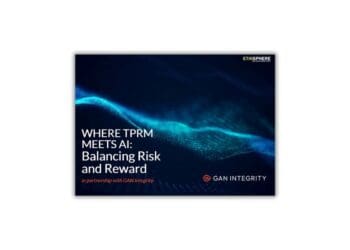CCI staff share recent surveys, reports and analysis on risk, compliance, governance, infosec and leadership issues. Share details of your survey with us: editor@corporatecomplianceinsights.com.
84% of employers expect Trump DEI regs to impact their business
Most US employers (84%) expect workplace regulations surrounding DEI to impact their businesses during the first year of the Trump Administration, followed closely by immigration policy concerns (75%), according to new research from employment law firm Littler.
The survey of nearly 350 in-house lawyers, business executives and HR professionals, the firm’s 13th annual, reveals employer anxiety about potential staffing challenges from the administration’s immigration policies, with more than half (58%) expressing concern. Meanwhile, litigation worries related to DEI practices have nearly doubled from 24% last year to 45% in the most recent survey.
Despite these concerns, nearly half of respondents (45%) report their organizations are not planning further rollbacks of DEI programs in response to executive orders — consistent with findings from Littler’s earlier research released in February.
Other key findings:
- A large majority (70%) of employers have seen increased accommodation requests related to mental health conditions, continuing an upward trend from previous years.
- Nearly a third (31%) of employers — and almost half (47%) of technology companies — are increasing AI use in the workplace under what they perceive as a more lax enforcement regime. Still, nearly a third (31%) have no policies governing employee use of AI technology.
- More than half (56%) of companies that increased in-office requirements have seen more requests for remote work accommodations.
- The overwhelming majority (82%) anticipate increased legislation at state and local levels impacting their workplaces.
“With [DEI] programs facing existential threats and unprecedented scrutiny from federal agencies, we’re seeing many employers wisely step back and analyze their … practices with an eye toward compliance and effectiveness,” said Jeanine Conley Daves, a shareholder at Littler.
The research indicates that while employers expect reduced federal enforcement in some areas — concern about NLRB enforcement dropped from 73% last year to 56% — they anticipate continued regulatory challenges as state and local governments introduce policies that may conflict with federal approaches.
More than half of financial fraud now AI-driven, research suggests
Most financial fraud now involves AI, with generative AI enabling criminals to create increasingly sophisticated deepfakes, synthetic identities and convincing scams, according to research from Feedzai, a financial crime prevention company.
The survey of more than 550 financial professionals indicates institutions are responding to this threat, with nine in 10 banks reportedly using AI for fraud detection and two-thirds having implemented these technologies within the past two years. Meanwhile, respondents report that criminals are employing various AI-powered tactics, including voice cloning (60%), SMS and phishing scams (59%) and deepfakes (44%).
Faced with these emerging threats, banks are deploying AI primarily for scam detection (50%), transaction fraud (39%) and AML (30%), though they encounter significant implementation challenges that criminals don’t face. Nearly nine in 10 institutions (87%) cite data management as their biggest obstacle, with fragmented data sources and regulatory constraints slowing AI adoption.
Other key findings:
- Nearly all surveyed financial institutions (92%) report fraudsters using generative AI in their schemes.
- A majority (56%) of professionals identify social engineering tactics powered by AI as a significant concern.
- Most banks (89%) prioritize explainability and transparency in their AI systems.
- More than four in 10 financial professionals (43%) report increased efficiency within fraud teams due to AI implementation.
“Today’s scams don’t come with typos and obvious red flags — they come with perfect grammar, realistic cloned voices, and videos of people who’ve never existed,” said Anusha Parisutham, senior director of product and AI at Feedzai.
Technology-driven risks top compliance concerns for US financial firms, survey finds
Nearly two-thirds of US regulatory compliance professionals (63%) view technology-driven risks as the most significant market force likely to cause compliance issues for financial services firms in 2025, according to new research from eflow Global, a compliance technology provider.
The survey of 300 compliance decision-makers across three continents, including 60 from the US, reveals that global economic instability (58%), increasing regulatory complexity (48%) and digital assets and crypto markets (37% each) round out the top concerns. Meanwhile, US compliance professionals report their greatest regulatory challenges include keeping abreast of regulatory changes (43%), assessing risk profiles across multiple asset classes (42%) and accurately identifying insider trading and market manipulation (40%).
Other key findings:
- Just over half (52%) of US regulatory professionals have only some degree of confidence in their firm’s ability to integrate trade and communications data.
- More than six in 10 respondents (62%) want greater transparency around regulator expectations and enforcement actions.
- Nearly half (48%) desire closer collaboration between regulators and compliance teams.
“With the volume of global enforcement actions surging by 260% year-over-year in 2024, and regulators increasingly targeting small- and mid-market firms, this should serve as a wake-up call for the thousands of smaller financial institutions and trading firms seeking to proactively enhance their compliance operations,” said Ben Parker, CEO of eflow Global.










